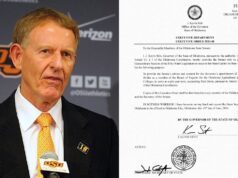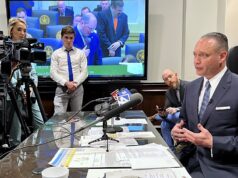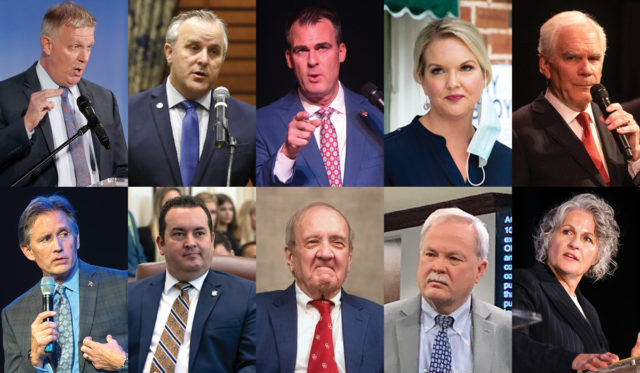
As 2022 comes to a close, it’s tough to recall all the stories and moments that made this year interesting, joyful or stressful. In years past, our staff has put together summaries of top headlines, reflections on key newsmakers and other end-of-year content.
This year, however, we decided to compile a list of 10 unexpected moments from 2022, including bizarre political shenanigans and significant events we witnessed that are worth recalling.
Click the buttons below to navigate between the moments, which are presented here in chronological order.
1Feb. 8: Greg Williams’ awkward audio
In early February, NonDoc obtained a voicemail recording of Oklahoma County Jail administrator Greg Williams and public information officer Mark Opgrande discussing the benefits COVID-19 had presented for the jail. The recording was inadvertently made after Williams left a voicemail on another number but didn’t hang up the phone.
In the recording, Williams referred to COVID-19 as “our friend” while also discussing with Opgrande how it has helped the jail.
“I mean, COVID has been wonderful for us,” Williams said in the voicemail, noting that the jail received $10 million in CARES Act funding for projects completed last year.
I will never forget sitting in the NonDoc News Dungeon and listening to the recording for the first time with our editor in chief, Tres Savage. There was a sort of weird comic element to it, in that the whole thing stemmed from someone not being able to complete the mundane task of hanging up a phone properly.
And then we get to the conversation itself, which was utterly weird, to say the least. The whole back and forth between Williams and Opgrande was sparked by a request from a French journalist making a documentary about incarceration in the United States. Put another way, our story only came together owing to a one-in-a-million phone mishap and a request from a journalist in Europe. It felt like an episode of some Vince Gilligan TV show.
But few, if any, found it amusing. The recording sparked outrage among activists who have fought to improve conditions at the troubled facility and others in the general public. Still, the jail trust, which oversees operations at the jail, chose to retain Williams, with some offering strong support.
“It was a poor choice of words, yeah,” jail trust member Ben Brown told KFOR. “But the truth is that that money was used to make things better at the jail, including pay and health care. I kid and say things that, you know, that really aren’t true, but they’re done in a kiddy manner between two friends. And those friends understand what it means, and they get it. So I, you know, I hate that this is being blown up.”
Ultimately, Williams’ employment did not survive 2022. He resigned in December just a month after the trust again chose to keep him in charge of the troubled facility that has seen 30 deaths in two years.
— Matt Patterson
2Feb. 17: Abby Broyles and the terrible, horrible, no good, very bad Valentine’s Day
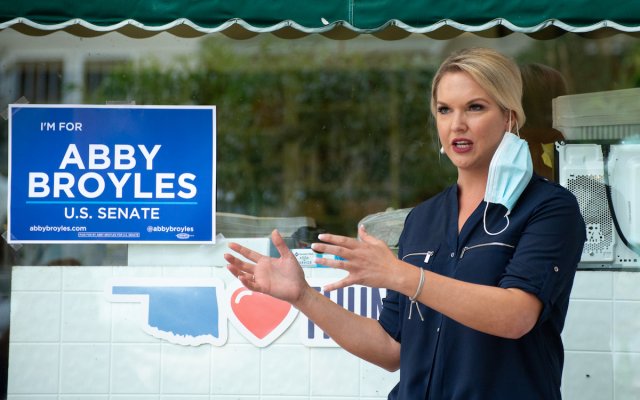
To start 2022, Abby Broyles’ campaign for Oklahoma’s 5th Congressional District seemed to be going to plan. She was considered the favorite to win the Democratic Party’s nomination for a chance to face incumbent GOP Rep. Stephanie Bice in the general election. But before we could even reach the Spring Equinox, all of that was upended after Broyles became belligerent and accosted girls at a Valentine’s Day-weekend tween birthday party that she attended at the request of the mother who hosted the event.
After we received a tip about a Twitter post by one mother of a verbally abused girl, the saga turned into one of the most bizarre stories I have ever covered. Interviewing tweens about the antics of a politician at a slumber party appears on no reporter’s bingo card, but in February, that’s exactly what I found myself doing.
According to those in attendance, Broyles drank heavily and vomited into a laundry hamper in front of the children. At one point, she assigned nicknames to several girls, calling one “acne fucker” and another “Hispanic fucker.”
My editor knew Broyles more than I did, so we decided he would make the inevitable phone call to hear her side of the story. Broyles, however, insisted it was not a story and that she had been in California on a fundraising trip instead of at the party. She threatened to sue us if we reported the story, and she said she didn’t think our publication had enough money to pay for a lawyer.
“I’m running for office. You don’t think this is a political attack? You don’t think this is something they cooked up?” Broyles said.
Her complete denial led us to gather additional sources, as well as photos of her drinking wine at the party, which we did not publish because they included children. The story blew up, with local and national media picking up the unusual events and turning them into top political headlines. The next day, Broyles gave an interview to her former employer, KFOR, where she admitted attending the party and said borrowed medication had caused her to blackout with no memory of the events. Asked why she had told NonDoc that she was not at the party, Broyles said she was “misquoted” and had never denied being there. As KFOR noted, however, our interview was taped, and Broyles had lied about not attending the party.
The story’s aftermath almost turned tragic, as Broyles attempted suicide March 2, as outlined in a March 24 blog post she made to suspend her campaign and announce that she had entered mental health and substance treatment. There is no shame in seeking mental health care, and Broyles could ultimately become a powerful advocate for others seeking to make changes in their lives.
— Matt Patterson
3March 23: For whom the Senate voucher bell tolls
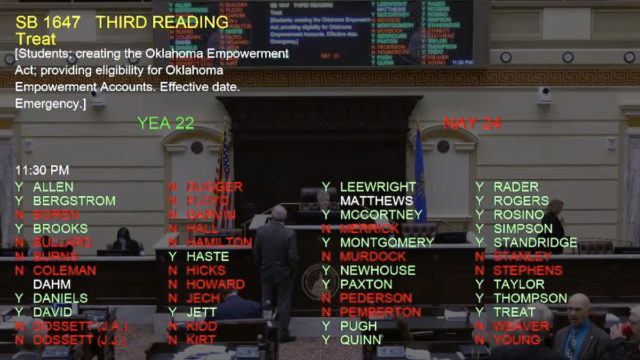
Being a journalist who covers the Legislature often involves trying to balance one’s personal life and sanity with the never-ending pressure of one question: Should I stay at the Capitol (or with Capitol people) longer to write, read bills, watch or learn about what’s happening behind closed doors? Sometimes being present is the sort of thing that lets a journalist catch a huge story. Other times, when floor work drags late into the night and the voting bell dings for hours on end, being present proves absolutely maddening.
I had already made plans to leave the State Capitol on March 23 when I learned the Senate would hold a late-night hearing on SB 1647, which proposed education empowerment accounts, also known as private school vouchers. I had made dinner plans with a beautiful woman, and I decided to keep them. I knew I could keep an eye on SB 1647’s question-and-answer period as well as senators’ debate by checking Twitter. I could even watch the video stream on my phone if I really needed to stay apprised. Despite my lingering guilt for valuing personal time over legislative inanity, I found myself enjoying post-dinner games of shuffleboard at Ye Ol’ Porthole, an obscure (and now closed) pool hall buried in an industrial area south of a Home Depot.
As my date talked with a friend, I checked my phone periodically. Two hours of yammering eventually yielded two more hours of the vote being held open. As various butt rock anthems raged on The Porthole’s jukebox, I watched Sen. Jake Merrick (R-OKC) vote against the bill, then switch briefly, and then switch back.
I could hear the incessant “ding!” of the voting bell from 10 miles away, even though the video did not broadcast it. But the bell was there, lodged in my head with two shots of tequila, a teaspoon of shuffleboard sand and too much second-hand smoke for me to understand why Senate President Pro Tempore Greg Treat (R-OKC) had held a vote on his own bill without knowing he had 25 senators ready to pass it.
I guess we all just wanna be big rock stars?
— Tres Savage
4April 25: Sean Roberts spells ‘T-h-e P-a-t-r-i-o-t’
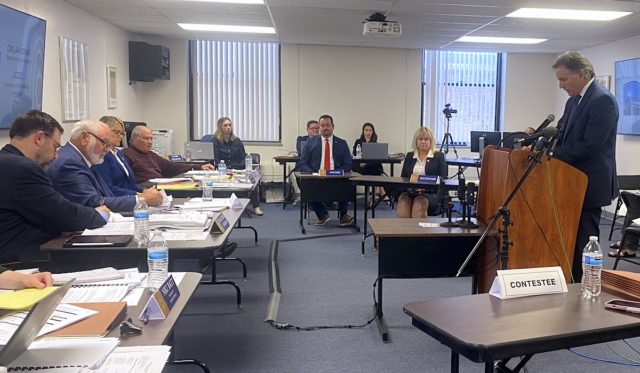
Spelling one’s name should be second nature, whether you’re a tri-county spelling bee champion or an 8-year-old tackling the third grade. But when a 48-year-old candidate for statewide office struggled to spell what he claimed to be his common nickname in a public meeting, it raised my eyebrows.
As Republican candidate for Oklahoma commissioner of labor and Rep. Sean Roberts (R-Hominy) was summoned by the Oklahoma State Election Board in April to defend his attempt to include the nickname “The Patriot” on the ballot, he didn’t help his plight when he struggled to spell the two words as he formally entered his appearance before the board.
“When asked to spell ‘patriot,’ Rep. Roberts had issues with spelling. Probably because he’s not used to spelling it out or writing it out as part of his legal name,” said witness Rep. Chris Kannady (R-OKC) during the hearing’s testimony.
Being an eternal optimist, I considered it a moment of much-needed comic relief during what ended up being 17 hours of hearings.
Osborn’s petition contesting Roberts’ candidacy argued that he has never officially gone by the nickname “The Patriot” and that while he has appeared on seven consecutive legislative election ballots, “The Patriot” was never listed as his name.
At the end of the day, a 46th birthday card, testimony from former U.S. Senate candidate Jackson Lahmeyer and Roberts’ claim that he has been referred to as “The Patriot” since junior high failed to fly with the board, which voted 3-0 to strike “The Patriot” from Roberts’ declaration of candidacy. I still chuckle as I imagine a middle schooler walking down the hallway to greetings of, “How’s it going, Patriot?” from fellow 12-year-olds. Perhaps they saluted him as he entered the lunchroom?
Osborn ended up defeating Roberts’ in the Republican primary runoff in August with 53 percent of the vote, but now — never fear — The Patriot is running to be chairman of the Oklahoma Republican Party. If there is future concern about his official use of the nickname, perhaps my reporting will be admitted into evidence.
— Megan Prather
5May 16: SB 984 resurrected, becomes law
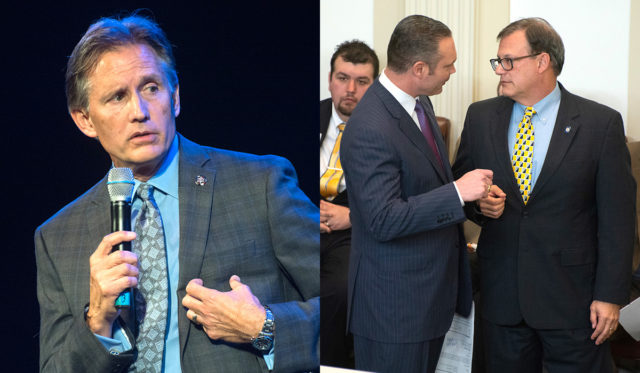
As I outlined in a recent Twitter thread, a series of stories regarding criminally indicted Rep. Terry O’Donnell (R-Catoosa) created some unexpected moments in 2022. If you are not familiar with the case, here are a few key details, with links to the stories I wrote from December 2021 through May of this year:
- O’Donnell and his wife, Teresa, were indicted in December 2021 for an alleged conspiracy to change Oklahoma law in a way that allowed her to succeed her mother as tag agent;
- Two parts of the law needed to be changed for this to happen. In 2018, a bill was passed allowing tag agents to designate their replacements in a formal letter to the Tax Commission. In 2019, O’Donnell himself ran a bill repealing the prohibition on legislators’ relatives being named tag agents;
- The 2019 bill became necessary because Sen. Greg Treat (R-OKC) — a native of Catoosa — was uncomfortable with changing the law in a way that would benefit O’Donnell’s family. However, the 2019 bill run by O’Donnell was designated during negotiations as a “priority” for the House, according to Gov. Kevin Stitt and Senate Appropriations Chairman Roger Thompson (R-Okemah);
- Additionally, the concern over O’Donnell’s apparent self-dealing drew the attention of O’Donnell’s political rivals, including then-Attorney General Mike Hunter, who asked Oklahoma County District Attorney David Prater to investigate the situation. Hunter told Prater he had a “conflict” and could not handle the matter himself.
That’s where things got wild. Shortly after my Jan. 27 story outlining how Hunter asked Prater to lead the investigation, I received a phone call from someone who made a serious allegation. That person also called Prater and relayed the same information: In spring 2021, Mike Hunter had asked House Speaker Charles McCall (R-Atoka) to stop SB 984, a bill carried by O’Donnell in the House, and had referenced the potential for O’Donnell to be prosecuted regarding the prior tag agent bills.
SB 984 was an old idea packaged into a new bill. Essentially, it proposed various transparency requirements and contingency fee caps on legal contracts between the state and private law firms. Powerful attorney groups connected to Hunter opposed the bill, but powerful conservative and business groups supported it, causing it to pass the Senate 38-6. Then, after Hunter’s message to McCall’s team, the bill stalled in the House.
I spent two months asking questions of the involved legislators and lobbyists in an effort to find any other explanation for why SB 984 had stalled, but there was none. Leading up to my April 7 story publishing, a series of rumors and lies were spread about me at the State Capitol, to law enforcement and to NonDoc donors. But days after the story published, SB 984 received a House committee hearing, eventually passing additional votes and being signed into law.
While SB 984’s transparency requirements are nice (and this is a good reminder to check which agencies have been complying so far), I could have cared less about the content of the measure. Investigating whether undue influence had been leveraged over the matter was the important part, and the fact the bill suddenly became law underscored the seriousness of the allegations at hand.
— Tres Savage
6June 16: John O’Connor’s rowdy crowd
It’s not every day the attorney general’s wife yells at you. Then again, it’s not every day that her husband is on stage and face-to-face with the man who wants to boot him out of office.
As one of two moderators for the only broadcasted debate between Attorney General John O’Connor and Republican challenger Gentner Drummond, I caught the brunt of Mrs. O’Connor’s frustration when Mr. O’Connor requested additional time during the night’s second question and, in an effort to keep us moving toward more substantial policy topics, I attempted to decline.
“You’re terrible!” she shouted from the front row. Perturbed with me, about two-dozen assembled O’Connor campaign staffers would spend the next hour of the debate booing, hooting, guffawing and generally acting the fool in the OCCC auditorium.
I was shocked by the behavior, but in retrospect I should have seen it coming. As I’d pulled up to the venue, a collegiate-aged bro who identified himself as O’Connor’s campaign manager (that was a lie) initially refused my request to remove hundreds of yard signs from the public college’s campus.
“Can someone in charge tell me that?” he asked.
“Bubba, I am in charge,” I said.
While I may be recalling my response too poetically, the gist of the situation was this: The O’Connor crowd at this year’s AG debate was the most disrespectful assemblage we’d welcomed since some raucous supporters of Kendra Horn repeatedly ignored our requests for civility and we ultimately had to have hired security escort a rude bastard out of our 5th Congressional District matchup in 2018.
This year, the O’Connor crowd’s behavior made me add new lines to our debate preambles, including threats to clear the audience from the room. So far, that has prevented any sort of repeat performance. Still, one night of ill-conceived behavior will not deter my belief that political debates are best held in a venue with an audience in attendance. Anyone who wants to serve in public office should be willing to stand on a stage and answer fair but firm questions from professional journalists.
However, those who attend political debates should be respectful of everyone around them. Shouting at those on stage is rude and unproductive, no matter who does it.
— Tres Savage
7June 22: Bill Crozier’s ringing Braum’s bag
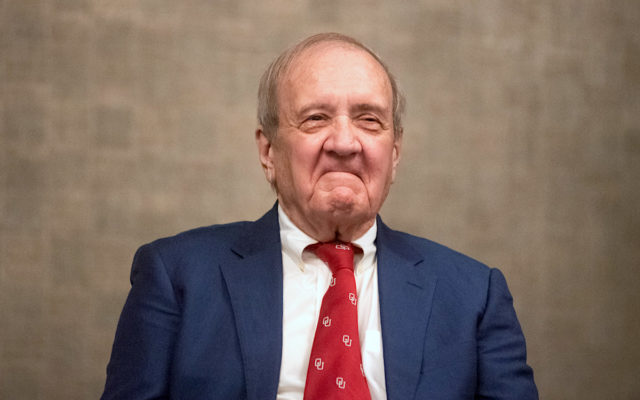
Election years are often unpleasant and almost always divisive, but sometimes there are moments of levity. On June 22, NonDoc co-hosted a Republican primary debate among state superintendent candidates in Oklahoma City, which featured Ryan Walters, Peggs Superintendent John Cox, Shawnee Superintendent April Grace and Union City resident William Crozier.
While the rest of the candidates stuck to a buttoned-down approach, Crozier let the personal anecdotes and jokes fly, telling stories of his years as an educator to a packed room at the Waterford Hotel in Oklahoma City. In one answer, Crozier talked about the moment in his youth when he was chased by a man with a shotgun while selling encyclopedias door-to-door in Los Angeles.
Then, from the seemingly bottomless depths of his brown paper Braum’s bag, Bill Crozier’s phone rang. And rang. And rang. At one point, News 9’s Storme Jones assisted Crozier in digging what appeared to be a Nokia-era flip phone from the bottom of the bag, which also contained the substantial assortment of items Crozier felt like he needed to get through a day in Oklahoma City.
Unfortunately, the episode was not caught on camera, but it was the funniest moment I saw in the 10 debates NonDoc hosted throughout the 2022 primaries and general election cycle. Crozier’s campaign fell well short of victory, but on the debate stage, his Braum’s bag mishap helped him seem like the sentimental crowd favorite.
— Matt Patterson
8Aug. 18: Prater crashes Calvey presser
Thursday, Aug. 18, was shaping up to be a beautiful Oklahoma summer day with temperatures in the 80s and a swimming pool invitation in my late-afternoon plans. Alas ….
Around 1 p.m., however, local political flack Andrew Speno texted me about a “big story for today.”
“The OSBI has launched an investigation into one of the most hotly contested races in Oklahoma. Their target is the Kevin Calvey for DA campaign,” Speno texted, adding that incumbent District Attorney David Prater had requested the investigation. “Prater is also a staunch supporter of Calvey’s opponent in the election next week. Calvey is holding a presser today to blast Prater and (Gayland) Gieger for this blatant abuse of power (…) in the hallway outside of Prater’s office.”
I told Speno, who was working for Calvey’s campaign, that I was “taking some personal time” that afternoon but that I would try to watch a livestream.
Less than an hour later, as I tried to conclude my day’s work and head home to grab sunscreen, swim trunks and other accoutrements, my phone rang. It was David Prater. Feeling defensive of my pool plans, I answered by saying: “So you’re about to confront Kevin Calvey at his press conference outside your office, and you’re calling to ruin my afternoon.”
Prater responded: “What?! What are you talking about?”
My stomach sank. I had honestly assumed he was calling to gripe about Calvey and tell me the origin of the story, which I had not heard about until Speno’s text. As it turned out, Prater was on his way back to his office, and the news of Calvey holding a press conference outside his door set Prater’s blood to boil. Our conversation concluded with several four-letter words from both of us: Prater saying that he wasn’t going to let Calvey talk shit in front of his office without being there to rebut it; me cursing the comedy of errors that was about to derail my effort to get some sun and exercise.
I stepped off the Oklahoma County Courthouse elevator to see Prater grinning in front of the cameras, which he ceded to Calvey to begin the year’s most bizarre press conference. I captured the trainwreck in the 21-minute video above, and I encourage you to watch the whole thing. Here are a few highlights:
- At the 0:22 mark, as Calvey begins his remarks, Prater winks at someone in the media scrum;
- Near the 1:45 mark, as Calvey accuses Prater abusing his power against elected officials throughout his career, Prater says from the wings, “Why don’t you specifically name cases, Kevin?” As Prater takes a step forward, Calvey calls him a “bully”;
- Questions of Calvey begin around the 5:30 mark;
- Prater steps up to the cameras around the 11:30 mark;
- Questions of Prater begin around the 15:40 mark, with Nolan Clay of The Oklahoman asking, “Are you a bully?”
- As Prater states that “we don’t allow elected officials to run amok in our county,” he lists types of elected officials, and Calvey drops his phone on the floor right as Prater says, “If it’s a county commissioner, we are going to call them out.”
— Tres Savage
9Oct. 11: Calvey lodges murder conspiracy accusation
Whether he is debating with legislators on the Oklahoma House floor or with Vicki Behenna on the stage of The Auditorium at The Douglass, Kevin Calvey has mastered the art of political theater, for better or worse.
During our Oklahoma County district attorney debate between Calvey and now-elected DA Vicki Behenna on Oct. 11, Matt Patterson and I sat in the front row of the auditorium. As Matt took notes for his debate recap, my job was to flag moments we found interesting and transcribe quotes to speed up the writing process.
As reporters do, we whispered back and forth about some of the night’s humorous moments, such as Calvey’s clever answer to the question about marijuana. While the debate got fiery at times, it built to a climax near its end when Calvey accused Behenna of being complicit in the disappearance of two missing persons who Behenna represented.
“Two Oklahomans are missing and may have been murdered because Vicki Behenna was willing to submit fake documents to a federal court to get her crooked client out of prison,” Calvey said, awkwardly reading his debate answers from a sheet of paper for much of the night.
Although I was admittedly out of the loop regarding the story when the question was asked on stage, I took a deep dive into the drama later that night.
In November 2021, a jury convicted Courtney Wells, Chris Mayes, and Charles Gooch of carrying out a fraudulent scheme at Big Red Kia and Big Red Sports and Imports, now defunct car dealerships. In May, Wells and her husband went missing after claiming to have left for a camping trip.
Shortly after their disappearance, Behenna, who represented Mayes — an owner of Big Red — along with other attorneys, requested a new trial in June related to the supposed discovery of exculpatory evidence: Emails purportedly sent by Wells that supposedly included a confession by Wells that would exonerate Mayes.
But two weeks after Calvey lodged his murder conspiracy allegation against Behenna, Wells and her husband were found in Mexico. They ultimately indicated to prosecutors that the purported emails were fake and that Mayes had helped coordinate their flights out of the country.
Since then, Behenna has been cleared of any wrongdoing related to the case, and she was elected Oklahoma County district attorney in November. But Calvey’s accusation made for a wild debate night.
“You’ve got one hell of a recap,” I told Matt seconds after closing statements ended.
— Joe Tomlinson
10Oct. 19: Oklahoma will ‘never’ be a top-10 state
As one of NonDoc’s summer interns and our newest full-time reporter — beginning in August — I was tasked with keeping time at each of our 10 debates during the 2022 election cycle.
The job came with its own perks: I got to sit right in front of the candidates (with the back of my head even occasionally making it on the livestream video), and I got to deploy a number of signs informing candidates of the time they had remaining to answer each question, including a red octagonal one that reads, “WHOA.”
I am sorry to say, however, that I was not always successful at my goal of getting the candidates to adhere to the time constraints. Politicians often have a lot to say — more than they could fit into their allotted 90 or 60 seconds — and while I made sure they could see my signs, they did not always follow them.
Perhaps the worst example of candidates refusing to heed my timekeeping signs was the October gubernatorial debate between Gov. Kevin Stitt and outgoing State Superintendent Joy Hofmeister. The debate was supposed to last about one hour, but instead it went on for nearly an hour and a half.
Near the beginning of the debate — when it was still on schedule — Stitt said something I will admit distracted me from my job for a moment.
“Being top 10 is an aspirational goal,” Stitt said around the 9:24 mark of the video of the debate. “It’s something that we’re never going to hit.”
Throughout his four years as governor and on the campaign trail, Stitt made his stated goal of turning Oklahoma into a “top 10 state” a cornerstone of his rhetoric. Hearing him admit to believing that Oklahoma would never become “top 10” after so much talk about it was quite the thing to witness.
To be fair to Stitt, he made his comment in the context of explaining how to lead and set goals for those under his charge.
Here’s the full quote: “As a leader and governor, whether you’re a CEO, you have to set a vision for all of your employees and for all of the state. So being top 10 is an aspirational goal. It’s something that we’re never going to hit, but it directs us in that we live in the greatest state in the country. The American dream is alive and well in Oklahoma.”
Twitter, however, did not see it that way, and a number of Hofmeister supporters had a field day with that soundbite.
That gaffe was not enough to sink Stitt, though, and he beat Hofmeister on Nov. 8 with 55 percent of the vote.
— Bennett Brinkman











